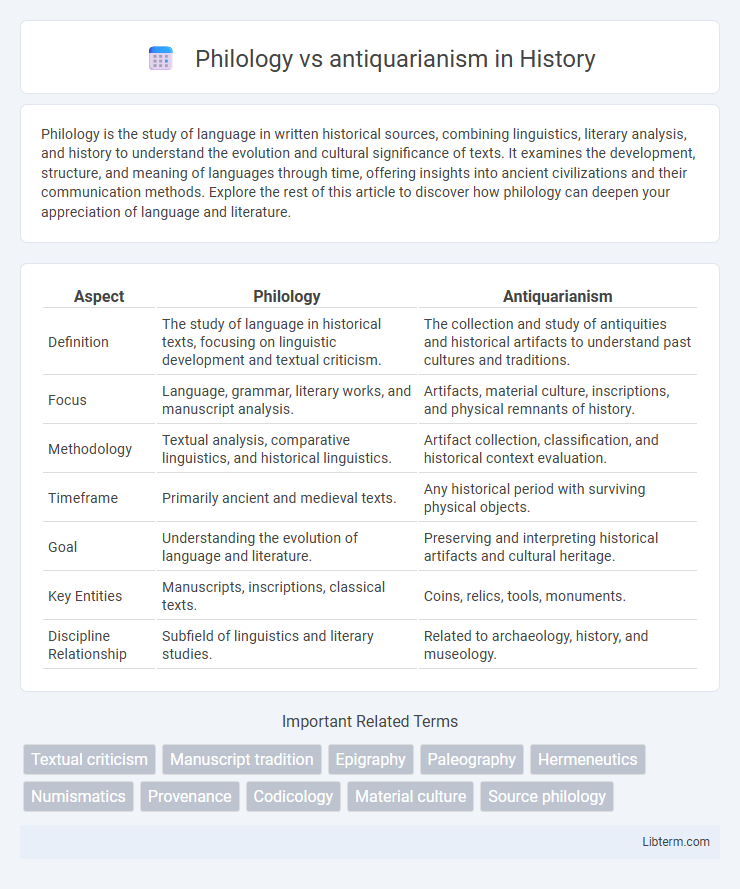Philology is the study of language in written historical sources, combining linguistics, literary analysis, and history to understand the evolution and cultural significance of texts. It examines the development, structure, and meaning of languages through time, offering insights into ancient civilizations and their communication methods. Explore the rest of this article to discover how philology can deepen your appreciation of language and literature.
Table of Comparison
| Aspect | Philology | Antiquarianism |
|---|---|---|
| Definition | The study of language in historical texts, focusing on linguistic development and textual criticism. | The collection and study of antiquities and historical artifacts to understand past cultures and traditions. |
| Focus | Language, grammar, literary works, and manuscript analysis. | Artifacts, material culture, inscriptions, and physical remnants of history. |
| Methodology | Textual analysis, comparative linguistics, and historical linguistics. | Artifact collection, classification, and historical context evaluation. |
| Timeframe | Primarily ancient and medieval texts. | Any historical period with surviving physical objects. |
| Goal | Understanding the evolution of language and literature. | Preserving and interpreting historical artifacts and cultural heritage. |
| Key Entities | Manuscripts, inscriptions, classical texts. | Coins, relics, tools, monuments. |
| Discipline Relationship | Subfield of linguistics and literary studies. | Related to archaeology, history, and museology. |
Introduction to Philology and Antiquarianism
Philology involves the systematic study of language in historical texts, emphasizing linguistic analysis, textual criticism, and the reconstruction of meaning over time. Antiquarianism focuses on collecting, preserving, and interpreting ancient artifacts, manuscripts, and monuments to understand past cultures and material history. Both disciplines contribute to historical research, with philology prioritizing language and literature, while antiquarianism centers on physical relics and archaeological evidence.
Defining Philology: Scope and Methods
Philology involves the systematic study of language in written historical sources, focusing on the development, structure, and meaning of texts through linguistic and literary analysis. Its methods include critical examination of manuscripts, textual criticism, and deciphering linguistic evolution to reconstruct original writings and understand cultural contexts. Unlike antiquarianism, which emphasizes collecting and preserving artifacts, philology prioritizes interpreting language and textual content to grasp historical and cultural nuances.
Antiquarianism Explained: Focus and Practices
Antiquarianism centers on the meticulous collection and analysis of ancient artifacts, inscriptions, and relics to reconstruct historical contexts and cultural heritage. It emphasizes empirical evidence and material culture, often prioritizing tangible objects over textual interpretation, distinguishing itself from philology's focus on language and literary texts. Antiquarian practices include cataloging artifacts, studying provenance, and preserving historical objects, fostering a comprehensive understanding of past civilizations through their physical remains.
Historical Origins of Philology and Antiquarianism
Philology originated in ancient Greece as the study of language, texts, and literary history, aiming to preserve and interpret classical works through critical analysis and linguistic expertise. Antiquarianism emerged during the Renaissance, focusing on the collection and preservation of artifacts, manuscripts, and historical objects to document cultural heritage. While philology emphasizes textual criticism and linguistic understanding, antiquarianism prioritizes material culture and empirical evidence for reconstructing historical contexts.
Key Differences Between Philology and Antiquarianism
Philology centers on the study of language, literary texts, and their historical development through critical analysis and interpretation of written materials. Antiquarianism primarily involves the collection, preservation, and detailed description of physical artifacts, ancient manuscripts, and historical objects without necessarily focusing on linguistic or literary context. The key difference lies in philology's emphasis on textual and linguistic analysis versus antiquarianism's focus on material culture and artifact documentation.
Overlapping Areas of Interest
Philology and antiquarianism both emphasize the study of ancient texts and artifacts to reconstruct historical contexts and cultural legacies, often overlapping in manuscript analysis and historical linguistics. Both disciplines engage in detailed examination of inscriptions, language evolution, and provenance to uncover nuanced understandings of past civilizations. The shared focus on primary sources and material culture bridges their methodologies, fostering interdisciplinary approaches in historical and linguistic scholarship.
Philology’s Contribution to Historical Understanding
Philology enhances historical understanding by analyzing ancient texts to reconstruct languages, cultures, and societies, offering insights into historical contexts. It decodes linguistic evolution and textual variations, enabling accurate interpretation of historical documents. This methodical approach allows historians to trace cultural transmission and intellectual history with greater precision than antiquarianism's focus on collecting artifacts.
Antiquarianism’s Role in Preserving Material Culture
Antiquarianism plays a crucial role in preserving material culture by systematically collecting, cataloging, and studying physical artifacts from past civilizations, ensuring tangible history remains accessible for future research. Unlike philology, which centers on textual analysis and linguistic heritage, antiquarianism emphasizes the conservation of objects such as coins, inscriptions, sculptures, and manuscripts, providing a multidimensional understanding of historical contexts. This focus on material evidence enriches cultural heritage by safeguarding artifacts that offer direct insights into ancient societies, complementing textual scholarship.
Modern Perspectives on Philology and Antiquarianism
Modern perspectives on philology emphasize its role in analyzing linguistic evolution, textual criticism, and cultural context, integrating digital humanities tools to enhance manuscript studies. Antiquarianism is increasingly viewed as foundational to historical preservation, with scholars valuing its meticulous collection and interpretation of material artifacts that inform historical narratives. The convergence of philology and antiquarianism in contemporary research fosters interdisciplinary approaches, advancing understanding of language, literature, and cultural heritage through both textual and material evidence.
Conclusion: Relevance in Contemporary Scholarship
Philology remains crucial in contemporary scholarship for its rigorous analysis of language, texts, and historical context, enabling deeper understanding of literary and cultural heritage. Antiquarianism, though more focused on collecting and preserving artifacts, complements philology by providing material evidence that enriches textual interpretations. Together, these disciplines inform interdisciplinary research, fostering comprehensive insights into history, culture, and linguistic evolution.
Philology Infographic

 libterm.com
libterm.com